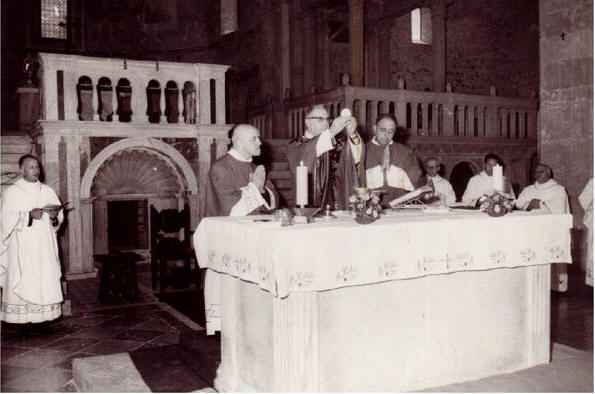
Siri the pope? Nope
There is a theory being peddled around by such sites as "The Pope In Red" (Sirists), which claims that Cardinal Giuseppe Siri was elected pope (Gregory XVII) in the 1958 conclave and that he was the true pope until his death in 1989, and that he presently has a successor in hiding somewhere.
The Sirists base their claim upon the following:

I had initially started to write an article refuting these various claims (which was not difficult to do as not a single one of them has any basis in provable fact), as well as to show how according to Catholic doctrine that is was impossible for Siri to have been the pope. But as this article was becoming quite lengthy, I set it aside in favor of another approach - something short, to the point, yet convincing.
On that theme, here are some relevant facts which are disputed by no one, including the Sirists themselves:
Yet despite admitting to all of the above listed facts, the Sirists try to dance around them with truly inane arguments, such as this one:
"If Pope Gregory offered the Novus Ordo Missae, *it certainly would have been possible for him to substitute the true and immemorial consecration of the chalice for the new consecration." (The Pope in Red - Defense Of Pope Gregory XVII Against CFN Attack, emphasis in orig.)
Yes, it would have been possible for him to do that, and it would also have been possible for him to substitute a nursery rhyme too, or any number of a million-and-one other things that are within the realm of possibilities. This is, of course, an absurd defense, because the Church's magisterium is not founded on possibilities, but upon proven facts. And proven facts that Siri was pope are wholly absent here.
"A fact is not presumed, unless proven."
(St. Alphonsus, Doctor of the Church - Theologia Moralis, Tract 1, Ch. 2.)
If a picture is worth a thousand words, then here are 7,000 words for the reader to consider. Bear in mind that if Siri actually believed that he was the pope, then, by definition, John XXIII, Paul VI, John Paul I and John Paul II were antipopes. Do these pictures, in any manner whatsoever, show that Siri believed them to be antipopes and himself to be the true pope?
Siri with John XXIII
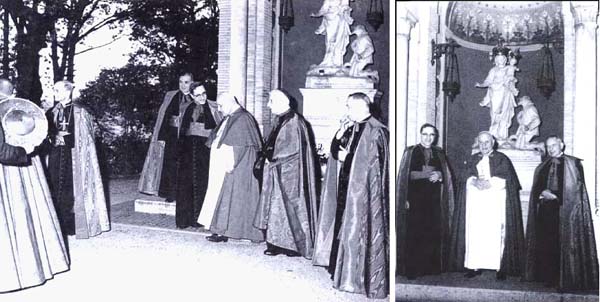 |
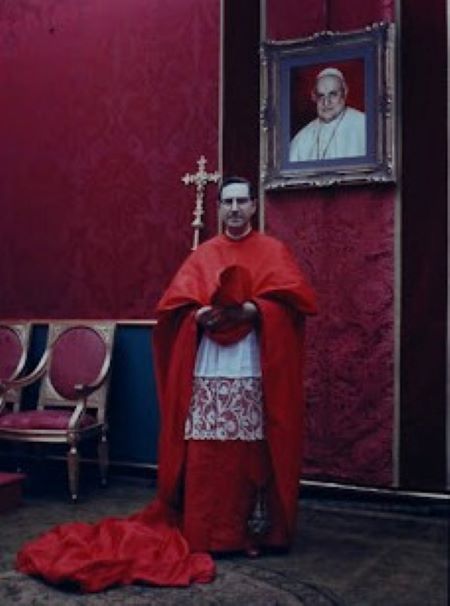 |
Siri with Paul VI
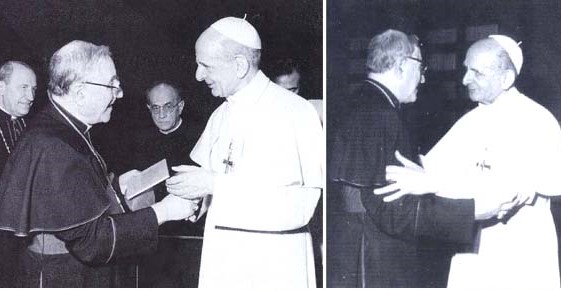 | 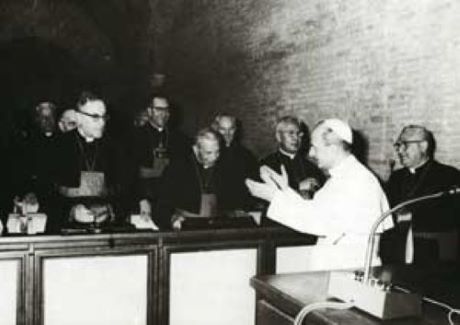 |
Siri with JP I
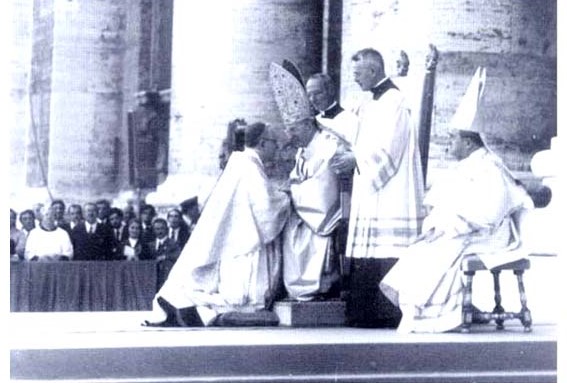 |
Siri with JP II
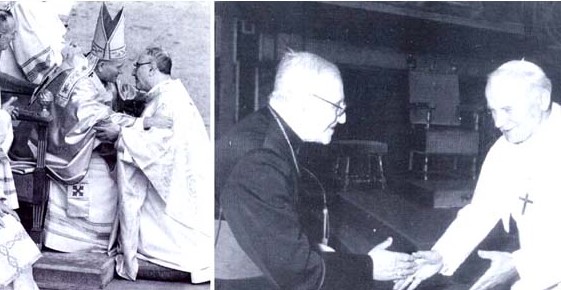 |
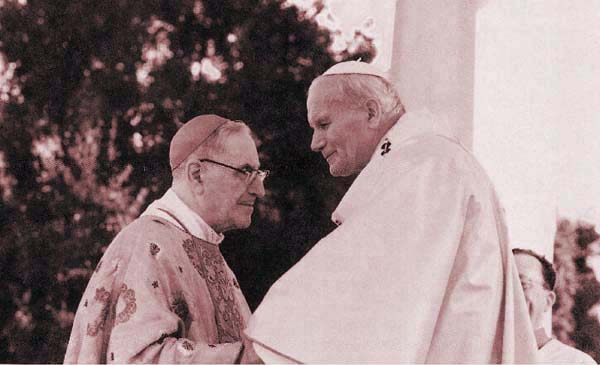 |
Catholic doctrine completely excludes any possibility of Siri having been the pope. Siri's conduct demonstrated that was not the pope. When asked, Siri twice stated that he was not the pope. So doctrine, conduct and testimony all say the same thing - he was not the pope. Conclusion - Siri was not the pope.
Bishop Joseph Marie
bishopjosephmarie.org
Email: me@bishopjosephmarie.org
[1]
Speech at the thanksgiving service for the election of John XXIII (1958)
This speech was delivered by Cardinal Giuseppe Siri, Archbishop of Genoa, on November 1, 1958, at the end of the religious service celebrated in his Cathedral of St. Lorenzo recognizing the elevation of John XXIII to the Papacy .
On All Saints Day, a grand and serene sight enlightens the souls of all believers: It is the spectacle of those who throughout time have obtained the Redemption of Christ - either the Christ who will come or the Christ who came - and who now live and reign with Him for all centuries in eternal glory.
There [in Heaven] they reestablish the true and lasting human family, the family of God, without needs, quarrels, defeats and wars. They, the Saints, both the canonized and uncanonized, are at the same time intensely united with us and present to us. As we consider this, the dear and pleasant memories of those we have loved and known return to us, those who preceded us in life and labor make up part of the assembly of Saints. In them shines what on earth death seems to have terminated; they exult over what our human misery each day tries to vilify.
On this luminous and serene day linked to our lives, families and hopes, I have called you together to thank God for the election of our Holy Father John XXIII. The great paternity of God is, since the eve of October 20, represented by this Pope. In him we reencounter our Holy Father, whose visible image was extinguished after the holy death of Pius XII. In him [John XXIII] all men who have sovereigns, chiefs and leaders but do not have a Father, ... recognize - in different ways and degrees - the same general lines and reasons for trust.
Let us thank God because we have a Pope again.
To have a Pope is not a miracle since this is part of the ordained constitution of the Church as established by Jesus Christ. Nonetheless, intense cause for gratitude remains. In each man that is raised to the Throne of Peter, we see again the providential hand of God over History. The Vicar of Christ is always a messenger of the grace and peace that comes from God Himself.
I, who speak to you, participated in the election of the Pope, and as a part of it I experienced the way God - leaving all men free - enters into events of this kind that truly and solemnly mark History. It is impossible for me to say what I felt when, hearing the voice of the Cardinal charged with counting the ballots resounding in the silence of the Sistine Chapel, I learned that the election of the Pope had been achieved. The Gospel and the order of Redemption move in human History revealing its final goals by means of a concrete and visible, social and juridical fact [the election of the Pope], established by the Church. The destiny of secondary points of History are included in the general plan of eternal Providence with a permanent reference to the Gospel and Redemption. These considerations are useful to evaluate what it is to have a Pope, the Head of the Church, and to understand what a change the election of a Pope makes in History.
We have to thank God for the choice He made. Anyone who knew the Patriarch of Venice and has followed the first, brief hours of this pontificate has already became aware of his great and lucid firmness without vacillations, brimming with a simple, cordial, expansive and appealing humanity. This makes one believe that in the aura of this temperament, peace, an invitation to understanding and a cordiality in treatment of others acquire a providential function in the world, a world that lacks reciprocal esteem and an open, confident smile. Everything leads one to think that this type of a man and government gives us, concretely and effectively, a direction and a social norm that are meant offer a better life and encouragement to countless people, not only Europeans, but also and above all, to non-Europeans, who were left far behind at the banquet of earthly goods caused by the greed of egoism. Everything leads one to expect that a new warmth will be disseminated to make relations between Catholics and our separated brethren smoother.
A new dawn has risen and it is singularly promising. Praised be to God !
As we thank God, logic reminds us of the duty that binds us to the Vicar of Christ. It demands affection, reverence and obedience. These are conditions to receive divine favor, because no one can presume divine favor if he does not welcome the one whom Jesus Christ has chosen, in the form and measure determined by Him. At this moment we must clearly understand that we cannot ever separate Jesus Christ from His representative, the visible head of the Church in the world. The gesture of Christ choosing His Vicar always requires that fidelity, clarity, sincerity and reverence that is owed to him.
Among the different ephemeral standards that the world loves to make, let us know how to lucidly discern and evaluate what comes from the passions and vileness, egoism and ignorance, and distinguish it from what comes from the sacrifice of the Calvary and the infinite amiability of God, from a guaranteed teaching and a revealed truth. Let us choose from History the best it has given and what failure never destroyed. Let us treasure the sincere and manifest gesture of a father [the Pope], which calls for any contrary suggestions to be suspended.
May God protect our Holy Father and give us the grace to be faithful to the integrity of our Faith and to His logic, being consistent to the end.
Source: Tradition in Action
[2]
Pastoral Letter for Lent 1985
The Pope Comes to Genoa !
Dear brethren, dear faithful,
On Christmas day 1984 I announced that the Sovereign Pontiff would come to Genoa. Now I can add that not only he will dedicate Sunday, September 22, to us, but also that he will give us Saturday afternoon of the 21st, thus having more time to be with the people. This visit is a great event. To make this clear, I invite you to make some reflections with me.
First, let us recall some past history. To escape the disorder in Rome, Pope Gelasius II agreed to be taken to Genoa by ship and spent some time in our city. It was he who consecrated San Lorenzo Cathedral in our city in 1118. Pope Innocent IV, a Genovese of the Fieschi family, also lived here for some time after he left Rome when he was threatened by Frederick II. Pope Gregory XI stayed in Genoa on his return of the Holy See to Rome after the exile in Avignon. It was actually in our city that St. Catherine of Siena, after conquering his many doubts, convinced him to continue the trip and restore the Apostolic See to the Eternal City.
In the 14th century, Urban IV had the longest stay in Genoa, residing in the building that still today is called the ‘Commenda.’ The last Pope to be here, two times in fact, was Pius VII: The first time he came through the city as the prisoner of Napoleon in 1809. The second time, he returned after being freed to fulfill the promise he had made in prison to crown Our Lady of Mercy in Savoy. He remained here for 15 days and stayed in an illustrious Genovese palace. On Ascension Day, accompanied by 15 Cardinals, he said a Cappella Papale Mass at the Church of the Annunciation [Annunziata]. One hundred and seventy years have passed! Now History returns!
John Paul II is changing the History of the Popes. Taking advantage of the changes of our times, with its condition for rapid travel, he brings the solicitude of a Pastor directly to the world. This is the point. He traverses the roads of the world to raise the thoughts of men toward their Creator, thus offering crucial support to their moral conscience, for without God moral conscience either does not exist or does not resist any of the great temptations. We must value the importance of this service he renders to mankind: without that conscience, treatises are useless and serve only to deceive men.
But it is not just for this that the Pope flies throughout the continents. He goes as the Pastor of souls: He reminds men of the truths that save; he confirms them in Faith and Hope; he raises Charity; he defends the weak with the Truth; he calls for Justice. He does all this making a visible and continuous sacrifice. His visits are pastoral. He will also have a pastoral visit with us.
I invited the Pope to the Santuario della Guardia (Sanctuary of the Madonna of Guardia), and he, a great devotee of the Madonna, joyfully accepted, confirming us in our confidence in the Blessed Virgin. The Sanctuary is the meeting point of all of us. The solutions for concerns of our city - which we still have among us - always pass through that Hill of Guardia, giving us the most secure protection.
We are expecting much from this visit. It would be unfair to be silent about this.
The Pope will be with us following a schedule whose details will become public in due time.
Now I invite you to reflect on who is the Pope. The value of the visit relies on this.
He is the Vicar of Christ. The words of the Gospel are applied to John Paul II since the moment of his election, just as they were to Peter: “You are Peter and upon this rock I will build My Church, and the gates of Hell will not prevail against it. And I will give you the keys of the Kingdom of Heaven; and whatsoever you shall bind on earth shall be bound in Heaven; and whatsoever you shall loose on earth will be loosed in Heaven” (Mt 16:18). The dignity of the Pope reflects something of the Majesty of God, and when we see him, simple and amiable with everyone, we should never forget that he is the Vicar of Christ
Because of his office, his blessing is worth more than all other blessings; for the same reason his prayers and all his actions are more important than the prayers and actions of all other men. To receive the Pope well, we should consider him not just as a sovereign whose influence has no equal in the world, but as we would receive Jesus Christ Himself.
Since on this happy occasion, the Faith is the light that illuminates everything and shows what the visit of a Pope is and how it can bring us closer to the Lord, we must make a spiritual preparation. Information on this will be forthcoming.
The visit of the Pope not only aligns us with him, but with God!
Source: Tradition in Action